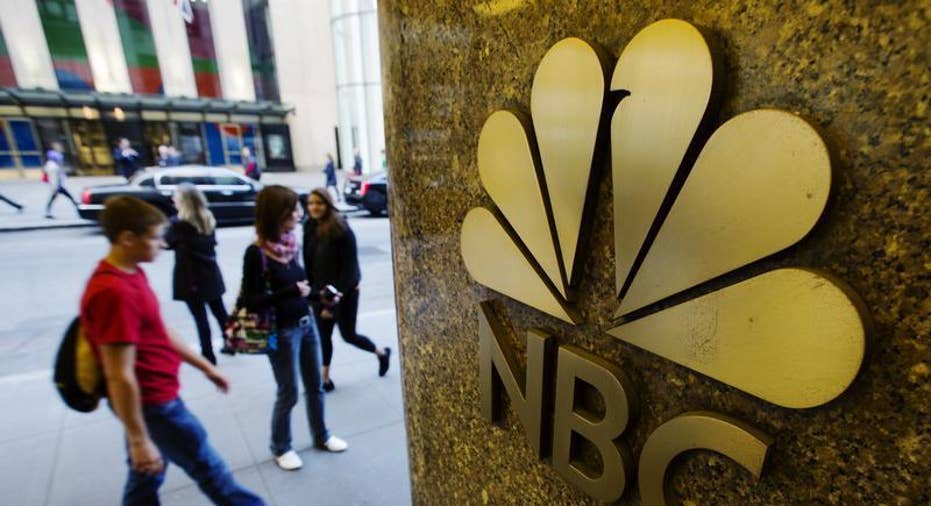U.S. broadcast TV ratings slide pressures ad rates at 'upfronts'

U.S. broadcast networks head into their biggest ad-selling season this week, competing with streaming services like Netflix, battling online players for ad dollars, and fending off hits starring zombies and duck hunters on cable.
The increased competition will force ABC, CBS, Fox and NBC to settle for their lowest average rate hikes in three years during the "upfront" selling season, Wall Street analysts say.
During the upfronts, networks preview shows for their fall schedules, trying to persuade advertisers to buy billions of dollars worth of commercial time in advance.
The broadcasters still command premium ad prices because they reach an audience that is far bigger than the viewership of any single cable channel. Upfront rates likely will rise by 6 percent on average, as the broadcasters book about $9 billion worth of ad inventory during the upfronts, Barclays Capital estimates.
While 6 percent is well ahead of the 1.3 percent annual inflation rate, it is lower than the rich gains networks enjoyed in recent years. Upfront ad rates increased by 7.5 percent last year, and by 11.1 percent the previous year.
"For the networks, they probably feel very challenged that they have more competitors and are facing lower ratings," said Mark Fratrik, chief economist at media research firm BIA/Kelsey.
"Advertisers have many more places to go to, so broadcasters are probably a little reticent of trying to push stronger (rates), even with this stronger economy," Fratrik added.
Viewers' biggest distraction is cable TV, which is churning out more hits that lure eyeballs from the Big Four. AMC's zombie thriller "The Walking Dead" and the A&E reality show "Duck Dynasty" haul in broadcast-sized audiences. "Walking Dead" averaged 10.7 million viewers this season, more than all but the top 12 shows on broadcast TV.
Online video players such as Hulu and Google Inc's YouTube are jockeying for ad dollars, and viewing hours are growing on Netflix, the streaming service that is making a big push into original programming with shows like political thriller "House of Cards."
Plus, networks don't yet get full credit in Nielsen ratings for the viewers who catch their favorite shows online.
So far this season, combined prime-time ratings on the four broadcasters declined 7.5 percent, the biggest year-over-year decline in six years, according to Nielsen data provided by Horizon Media and based on live viewing and those who record and watch the show the same day.
ADVERTISERS PUSH FOR LOWER RATES
Advertisers intend to use the reduced numbers of eyeballs to push for lower rate increases in the annual scrum. Network executives have countered in recent years that they still deliver the largest numbers of viewers at any one time.
Broadcasters also are home to the biggest sporting events, which draw premium ad dollars because viewers tend to watch them live without skipping commercials.
CBS, the ratings leader in total viewers, is projected to score the largest uptick, 6.5 percent, Barclays forecast, followed by ABC with 6 percent, Fox with 5.5 percent, and NBC with 5 percent.
"I am extremely bullish about the upfront marketplace," CBS Chief Executive Leslie Moonves said on a May 1 conference call.
Moonves' network leads in the advertiser-coveted 18- to 49-year-old age group, lifted by February's Super Bowl broadcast. Without the Super Bowl, CBS' same-day ratings for total viewers fell 5.7 percent.
Fox's audience plunged 16.7 percent this season, pulled down by the dwindling audience for the once-unbeatable singing competition "American Idol."
NBC, in the ratings basement for years, gained ground in the fall but faltered in the new year when its popular singing competition "The Voice" went on hiatus. Its season-to-date ratings are about flat. ABC's audience declined 9 percent.
COULD BE WORSE
Despite these challenges, a 6 percent rate hike still represents a healthy gain, analysts say, showing that demand for ad time on broadcast TV remains the preferred platform for advertisers to reach a large audience.
"Despite some of the chatter out there, TV advertising is holding up really well," Morningstar analyst Michael Corty said.
And if the networks do not like the rates they are seeing during the upfront season, they can hold back inventory and sell it later on the last-minute "scatter" market.
To better compete with the one-hour cable hits such as the "Homeland" security thriller and the "Game of Thrones" fantasy series, the networks are offering their own dramatic fare, hoping to get viewers to tune in every week to catch the latest twist in a running story.
Fox has already picked up legal drama "Rake" starring Emmy winner Greg Kinnear, and NBC has ordered supernatural drama "Believe" from "Lost" creator J.J. Abrams.
Among the other upcoming new shows, ABC has a drama based on S.H.I.E.L.D., the Marvel comics intelligence agency, and produced by "Avengers" movie director Joss Whedon.
"Everyone is still looking for that next drama," said Darcy Bowe, director at media agency Starcom USA. "It's still sort of the gold standard by which prime time television is upheld."
(Reporting by Lisa Richwine; Edited by Ronald Grover and Tim Dobbyn)



















